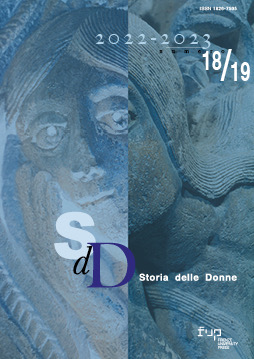Disgregare la territorializzazione dei generi: femminismi di colore anni 1980 e intersezionalità
Published 2023-08-03
Keywords
- thinking plural,
- Gloria Anzaldúa,
- limes and border,
- mobility,
- women of colour
- (de)coloniality,
- identity and dispatriation,
- cross-border and intersectional feminisms,
- geo-corpo-graphies of mobility,
- trespassing and encroachments,
- transterritorialisation ...More
How to Cite
Copyright (c) 2023 Paola Zaccaria

This work is licensed under a Creative Commons Attribution 4.0 International License.
Abstract
The essay connects current transnational and intersectional feminist movements to the revolutionary corpographic thinking-feeling of the women of color’s works and movements in the late 20th century that disrupted the boundaries between genders, genres and belonging. Thinking borders entails thinking about the implications of the geopolitical technologies of borders and barriers, but above all thinking from the condition of the crosser without rights, from the psycho-geo-corpographic space of uncertainty, deterritorialisation, translocality, displacement. It likewise analyzes the non-occluding, but transformative, character of the spatial concept of limes/border with respect to that of frontier/wall/boundary. A character to be extended also to experiential, cognitive and geo-political pathways such as feminist practices aimed at destabilising the no-trespassing signals of nationalist borders imposed by hegemonic male sovereignty policies. Practices such as multilingualism, intersectionality, intercultural translation lead the way, together with anthologies that have by now become classic, and kinds of gnoseologies through which radical transformations, pluridiversity, forms of critical thinking have been achieved. As a result, both the decolonisation of knowledge from a feminist perspective of the limes, and the cross-fertilisation through intercultural translation were encouraged, thus problematising the universal vs. particular dichotomy.

